 Petzlover
Petzlover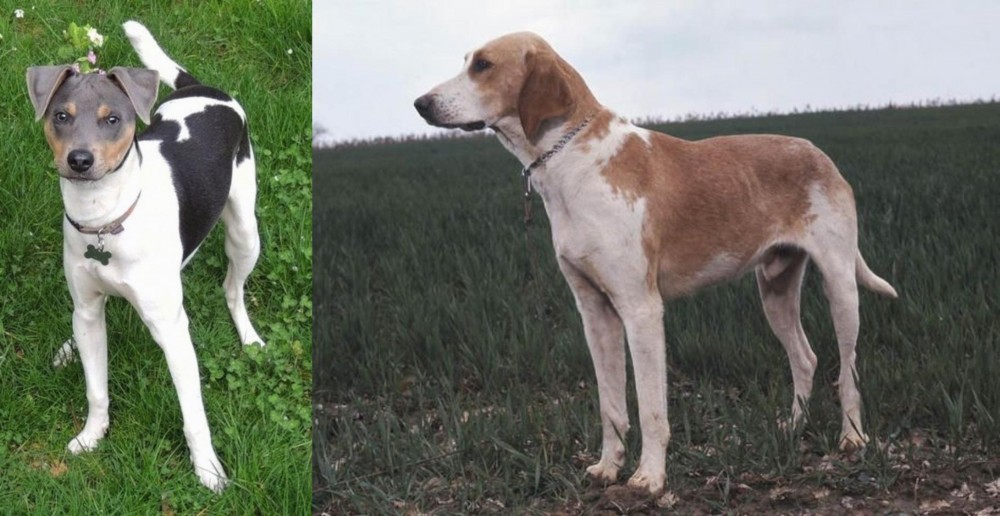 Brazilian Terrier is originated from Brazil but Grand Anglo-Francais Blanc et Orange is originated from France. Brazilian Terrier may grow 30 cm / 11 inches shorter than Grand Anglo-Francais Blanc et Orange. Brazilian Terrier may weigh 26 kg / 57 pounds lesser than Grand Anglo-Francais Blanc et Orange. Both Brazilian Terrier and Grand Anglo-Francais Blanc et Orange has almost same life span. Both Brazilian Terrier and Grand Anglo-Francais Blanc et Orange has almost same litter size. Both Brazilian Terrier and Grand Anglo-Francais Blanc et Orange requires Low Maintenance.
Brazilian Terrier is originated from Brazil but Grand Anglo-Francais Blanc et Orange is originated from France. Brazilian Terrier may grow 30 cm / 11 inches shorter than Grand Anglo-Francais Blanc et Orange. Brazilian Terrier may weigh 26 kg / 57 pounds lesser than Grand Anglo-Francais Blanc et Orange. Both Brazilian Terrier and Grand Anglo-Francais Blanc et Orange has almost same life span. Both Brazilian Terrier and Grand Anglo-Francais Blanc et Orange has almost same litter size. Both Brazilian Terrier and Grand Anglo-Francais Blanc et Orange requires Low Maintenance.
 Though its exact origins are questioned it is known that the Brazillian Terrier was developed in Brazil and along with the Fila Brasileiro, are the only authentic Brazillian breeds. In the early 1800’s the Jack Russel Terrier, Fox Terrier, Chihuahuas and Miniature Pinschers were mixed to create the Brazillian Terrier. The Terrier breed was brought to Brazil by Europeans and there were probably both the Jack Russel and the Fox Terrier in the mix. Very popular within its own country the Brazillian Terrier is barely known outside Brazil. They were registered in 1973 even though they have been around in Brazil since the 1800’s. They are both single and pack hunting dogs. They chase and surround prey until the prey becomes too exhausted to run or fight. The Brazillian Terrier is larger than any European or North American Terrier. They are also less aggressive than other terrier types so that pack hunting became possible. They were built to work in the heat for long periods of time. Their stamina far surpassed other terriers as did their resistance to parasites and diseases.
Though its exact origins are questioned it is known that the Brazillian Terrier was developed in Brazil and along with the Fila Brasileiro, are the only authentic Brazillian breeds. In the early 1800’s the Jack Russel Terrier, Fox Terrier, Chihuahuas and Miniature Pinschers were mixed to create the Brazillian Terrier. The Terrier breed was brought to Brazil by Europeans and there were probably both the Jack Russel and the Fox Terrier in the mix. Very popular within its own country the Brazillian Terrier is barely known outside Brazil. They were registered in 1973 even though they have been around in Brazil since the 1800’s. They are both single and pack hunting dogs. They chase and surround prey until the prey becomes too exhausted to run or fight. The Brazillian Terrier is larger than any European or North American Terrier. They are also less aggressive than other terrier types so that pack hunting became possible. They were built to work in the heat for long periods of time. Their stamina far surpassed other terriers as did their resistance to parasites and diseases.
Many farmers and plantation owners came to values them for their ability to hunt down and eliminate vermin on the land and thus help with increased production of livestock and crops. They were so loved by the farmers and plantation owners that they began known as the “dog of the common people”. Yet it was not only the rural folks who valued this breed, but the people of the cities did as well. Because they were good ratters, a reasonable size, affectionate and loyal, many urban households sported a Brazillian Terrier. The breed spread throughout the country.
The Brazillian Terrier was kept mostly pure bred throughout its history but due to lack of pedigrees and paperwork it was not recognized by any kennel club unit 1973 when Brazillian breeders formed the Clube de Fox Paulistinha or CPF. They had a standard developed and created a stud book. By 1991 they were still not officially recognized but the CFP and the CBKC (Confederacio Brasilera de Cinofilia) began the process of establishing acceptable pedigrees and recognition of the breed. The FCI recognized the breed in 2007.
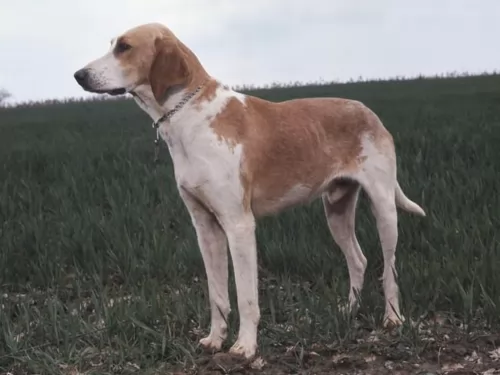 The Grand Anglo-Français Blanc et Orange is one of three Grand Anglo-Français breeds. The dogs comes from crossing French scenting hounds with English Foxhounds way back in the 19th century.
The Grand Anglo-Français Blanc et Orange is one of three Grand Anglo-Français breeds. The dogs comes from crossing French scenting hounds with English Foxhounds way back in the 19th century.
The sporting dog is rare, believing to be be pretty much confined to their country of origin – France. It is recognized in France by the French Kennel Club and also internationally by the Federation Cynologique Internationale. Since 2006, they have been recognized by the UKC and are thought to be kept essentially as a working dog as opposed to being kept as a companion dog.
 The Brazillian Terrier is a small to medium sized dog with a white – tricolor (tan and black) coat. It has a narrow chest, a triangular rather flat skull, the tail is docked, folded, half pricked hears, and the body is well-balanced. Its legs are long and athletic, and the coat is very short and very fine. He has round eyes that can be green, blue, brown or gray. They are very much like the Jack Russel in temperament. His expression should reflect that temperament in its eagerness and alertness.
The Brazillian Terrier is a small to medium sized dog with a white – tricolor (tan and black) coat. It has a narrow chest, a triangular rather flat skull, the tail is docked, folded, half pricked hears, and the body is well-balanced. Its legs are long and athletic, and the coat is very short and very fine. He has round eyes that can be green, blue, brown or gray. They are very much like the Jack Russel in temperament. His expression should reflect that temperament in its eagerness and alertness.
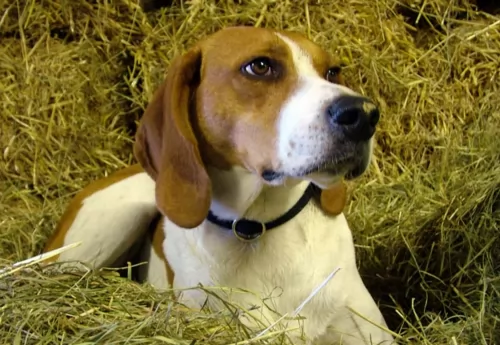 The lean, muscular Grand Anglo-Français Blanc et Orange is a large, powerful dog standing at 60 – 70cm at the withers and weighing 30 to 36 kg.
The lean, muscular Grand Anglo-Français Blanc et Orange is a large, powerful dog standing at 60 – 70cm at the withers and weighing 30 to 36 kg.
He has a short, broad head with a broad, flat skull. He has long legs, a long tail and long, floppy ears. His coat is white with orange markings. These dogs are instinctive hunters with a superb sense of smell and the ability to track their prey for miles.
Sociable, independent, loving and loyal, the Grand Anglo-Français Blanc et Orange can become attached to his owner. He doesn't want to be left alone for long periods of time, becoming bored and destructive.
Training and socialization is excellent for your dog, making him obedient and also more relaxed when you're not there.While he is patient and good with children, if you're looking for a playful pet, this dog wouldn't come as recommended for children, as his heart longs to just be outside on the hunt.
 The Brazillian Terrier is very much like his ancestor the Jack Russell. Like the JR Terrier he is friendly, intelligent, alert, playful, and loves to dig. They are courageous and fearless. They will obey but only if they know and believe you are really in charge. Otherwise they are intelligent enough to be very independent, determined and willful. At the same time, they are utterly loyal to their people. He needs a lot of toys but don’t let him live with other small animals. His hunting instincts may be the strongest of all terriers and he may harm small animals in the home. You have to teach him when to stop barking. Their love of play would consume your entire day if you let them. You should understand the terrier personality before you acquire a Brazillian Terrier.
The Brazillian Terrier is very much like his ancestor the Jack Russell. Like the JR Terrier he is friendly, intelligent, alert, playful, and loves to dig. They are courageous and fearless. They will obey but only if they know and believe you are really in charge. Otherwise they are intelligent enough to be very independent, determined and willful. At the same time, they are utterly loyal to their people. He needs a lot of toys but don’t let him live with other small animals. His hunting instincts may be the strongest of all terriers and he may harm small animals in the home. You have to teach him when to stop barking. Their love of play would consume your entire day if you let them. You should understand the terrier personality before you acquire a Brazillian Terrier.
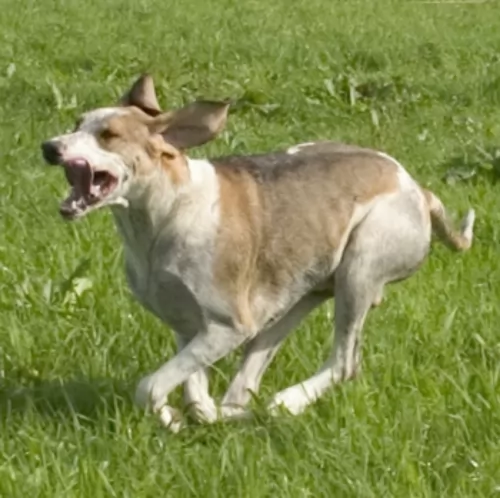 The Grand Anglo – Francais et Orange has always been a pack dog and used to being social. He will get on well with his entire human family as well as with any other pets in the home.
The Grand Anglo – Francais et Orange has always been a pack dog and used to being social. He will get on well with his entire human family as well as with any other pets in the home.
The Grand Anglo-Francais Blanc et Orange is a loyal dog, and when trained he becomes an excellent companion. He is patient with children, but doesn't make a particularly great playmate as he has a more serious personality.
The Grand Anglo-Francais Blanc et Orange is a dog that has been specifically developed to hunt, so ensure that he gets a good amount of exercise. While he is essentially a dog that loves working in a pack, he can still make his human family a loving and devoted pet.
 The breed is mostly healthy except for hunting accidents and a few generic issues they are susceptible to. This includes things like Dental and eye issues, the usual ear issues, liver issues, allergies, epilepsy and patellar luxation. However, they are more likely to have issues related to hunting than another of these predisposed conditions
The breed is mostly healthy except for hunting accidents and a few generic issues they are susceptible to. This includes things like Dental and eye issues, the usual ear issues, liver issues, allergies, epilepsy and patellar luxation. However, they are more likely to have issues related to hunting than another of these predisposed conditions
 Capable of reaching 10 to 12 years in age, you won't really find any particular health issues with this dog. He is a fairly healthy dog and will be able to reach a good age with good nutrition, exercise, love and care.
Capable of reaching 10 to 12 years in age, you won't really find any particular health issues with this dog. He is a fairly healthy dog and will be able to reach a good age with good nutrition, exercise, love and care.
Because of the long, floppy ears, you want to be checking inside the ears. As a hunting scentdog, he will chase his prey through water if needs be, and damp ears can encourage bacteria.
Ear infections are common in most dogs, and you'll notice your pet scratching and rubbing at his ear and even shaking his head. You may also notice swelling or redness. Veterinary intervention will be necessary.
If your dog's ear infection has cleared up, you can maintain the health of the ear by cleaning them with a gentle cleanser and cotton wool. There is always caution when cleaning a dog’s ear, and rupturing the ear drum is one. Be careful, and if you're not sure, rather make an appointment with your vet to have his ears cleaned.
 This is still a working dog and a terrier at that. They are high energy, athletic dogs. Feed a high-quality food at the rate of 1 to 2 cups per day, split into 2 meals. Treat are good for training but if your Brazillian Terrier is not hunting or working in some way, stay away from too much food and treats as he can easily become obese.
This is still a working dog and a terrier at that. They are high energy, athletic dogs. Feed a high-quality food at the rate of 1 to 2 cups per day, split into 2 meals. Treat are good for training but if your Brazillian Terrier is not hunting or working in some way, stay away from too much food and treats as he can easily become obese.
As mentioned previously, the biggest concern with this breed is hunting accidents or injuries. Look out for ear and skin infections or allergies. For the most part this is a hardy, healthy breed.
A very energetic dog, the Brazillian Terrier like its ancestors has a need to work off that energy. Yes, he is an urban dog and can live in an apartment, but you better have a dog park or a competition or some place to hunt because his need for exercise cannot be answered by daily walks and running around an apartment. IF your Brazillian Terrier is not stimulated physically and mentally on a daily basis he will become destructive, hyperactive and very, very unhappy. Don’t just stick him in a yard and leave him either as terriers are known to dig and escape and he will too.
They excel at agility, flyball, obedience and confirmation. They love to chase things and they love to explore. Barn Hunt would also be a good game for them. They are very smart, so their physical exercise should be paired with mental stimulation.
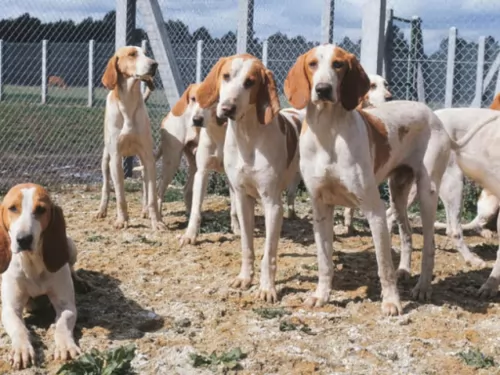 As a scenthound, your Grand Anglo-Français Blanc et Orange loves being outdoors and following a scent trail. These dogs therefore are better suited to life in the countryside as opposed to life in the city. Make sure you provide him with plenty of exercise – walks, swimming and running with you when you go cycling or jogging. Include ball- and rope games too.
As a scenthound, your Grand Anglo-Français Blanc et Orange loves being outdoors and following a scent trail. These dogs therefore are better suited to life in the countryside as opposed to life in the city. Make sure you provide him with plenty of exercise – walks, swimming and running with you when you go cycling or jogging. Include ball- and rope games too.
Your orange and white scent dog will thrive on you taking time out for him to brush his short coat twice a week and to also check for fleas and ticks at the same time.
Looking forward to his food, your energetic Grand Anglo-Français Blanc et Orange will require a high quality commercially manufactured food. Make sure that you buy the best brands to ensure your pet gets his vitamins and minerals in instead of just a lot of fillers, colorants and preservatives.
Many dog owners prefer giving their dogs several smaller meals throughout the day as opposed to one or two large meals. With his dry kibble you can add in some raw meat from time to time as well as cooked brown rice, cooked chicken and vegetables. See that he has access to a constant supply of fresh, cool water.